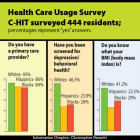Behavioral Health Homes
State Aims To Eliminate Barriers To Medical Care For The Mentally Ill
|
People with severe mental illness die 25 years earlier than the general population and 68 percent of the mentally ill have at least one chronic physical health condition, studies show. They don’t receive the care they need because mentally ill people are often discriminated against by medical practitioners and their mental illness can make it difficult for them to be proactive about their care, according to several mental health professionals. Daniela Giordano, public policy director of National Alliance for Mental Illness of Connecticut, said the problem is often a lack of understanding of mental illness by some health care providers. Giordano said she knows of people with mental illness whose “thoughts and comments were dismissed” by medical providers who view these patients through “a different lens.”
A state project is addressing such barriers to necessary medical care faced by low-income mentally ill people. Under the program, called Behavioral Health Homes (BHH) and based in mental health facilities where people are already receiving outpatient services, staff members coordinate participants’ mental health and primary care.


